

It’s All Your Fault: High Conflict People
TruStory FM
Hosted by Bill Eddy, LCSW, Esq. and Megan Hunter, MBA, It’s All Your Fault! High Conflict People explores the five types of people who can ruin your life—people with high conflict personalities and how they weave themselves into our lives in romance, at work, next door, at school, places of worship, and just about everywhere, causing chaos, exhaustion, and dread for everyone else.
They are the most difficult of difficult people — some would say they’re toxic. Without them, tv shows, movies, and the news would be boring, but who wants to live that way in your own life!
Have you ever wanted to know what drives them to act this way?
In the It’s All Your Fault podcast, we’ll take you behind the scenes to understand what’s happening in the brain and illuminates why we pick HCPs as life partners, why we hire them, and how we can handle interactions and relationships with them. We break down everything you ever wanted to know about people with the 5 high conflict personality types: narcissistic, borderline, histrionic, antisocial/sociopath, and paranoid.
And we’ll give you tips on how to spot them and how to deal with them.
They are the most difficult of difficult people — some would say they’re toxic. Without them, tv shows, movies, and the news would be boring, but who wants to live that way in your own life!
Have you ever wanted to know what drives them to act this way?
In the It’s All Your Fault podcast, we’ll take you behind the scenes to understand what’s happening in the brain and illuminates why we pick HCPs as life partners, why we hire them, and how we can handle interactions and relationships with them. We break down everything you ever wanted to know about people with the 5 high conflict personality types: narcissistic, borderline, histrionic, antisocial/sociopath, and paranoid.
And we’ll give you tips on how to spot them and how to deal with them.
Episodes
Mentioned books
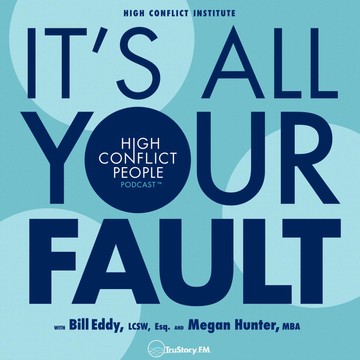
Apr 10, 2025 • 46min
DNA Surprises & Family Secrets: Managing Genetic Identity Discoveries with Kara Rubenstein Deyerin
Join Kara Rubenstein Deyerin, founder of Right to Know, as she shares her journey from discovering her own misattributed parentage through a DNA test to advocating for genetic identity rights. She discusses the emotional turmoil and family conflicts that can arise from such surprises, highlighting the importance of setting boundaries and managing expectations. The conversation also covers the complexities of non-paternal events and the vital role of communication for those navigating the stigma of unexpected family revelations.
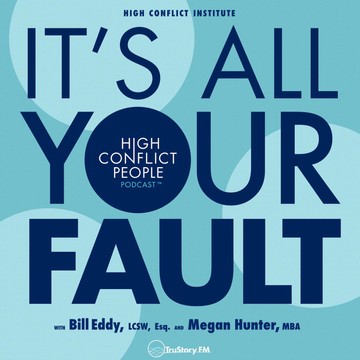
Apr 3, 2025 • 55min
Negotiation's Missing Peace: Finding Humanity in High Conflict with Michèle Huff
Join Michèle Huff, a transactional lawyer and Executive Director at UC Berkeley, as she unveils her transformative negotiation techniques based on empathy and human connection. She draws from Buddhist principles to emphasize internal transformation when dealing with high conflict personalities. Topics include the crucial role of soft skills, the dangers of dehumanization, and practical strategies like mindful breathing for maintaining composure. Huff's insights aim to redefine negotiations in high-stakes environments, blending compassion with effective problem-solving.
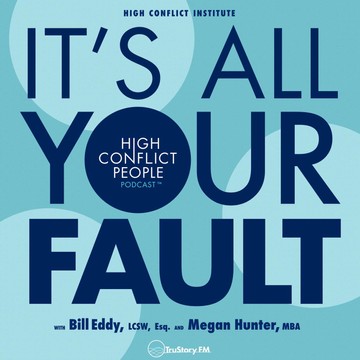
Mar 27, 2025 • 46min
Be Assertive, Not Aggressive: Winning in Family Court with Judge Bruce Cohen (ret.)
In this engaging conversation, retired Judge Bruce Cohen shares his extensive knowledge of family law and unpacks the crucial difference between assertiveness and aggressiveness in court. He emphasizes how assertive communication can lead to better outcomes in custody disputes, while aggression often escalates conflict. The discussion also touches on managing high-conflict personalities without resorting to diagnosing, focusing on behavior instead. Judge Cohen provides practical tips for legal writing and presenting cases effectively, ensuring clarity and impact in family court.
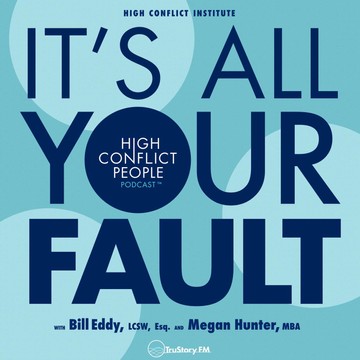
Mar 20, 2025 • 39min
Zero to Sixty: Understanding Why Some People Can't Control Their Anger
Explore the fascinating link between anger and high-conflict personalities with insights from Bill Eddy and Megan Hunter. Discover the surprising findings from Ohio State University that challenge traditional anger management techniques. Learn how distinct personality traits influence the way individuals express anger, and the critical role of emotional regulation in interpersonal conflicts. The duo highlights the power of human connection, revealing practical strategies for managing anger and fostering positive communication.
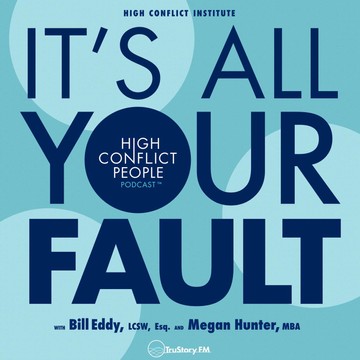
Mar 13, 2025 • 33min
Big Emotions Explained: Understanding Emotion Dysregulation and BPD
Explore the intricacies of emotion dysregulation, particularly its ties to borderline personality disorder. Delve into how childhood experiences and brain structure impact emotional responses. Learn to differentiate between typical teenage angst and concerning behaviors, all while gaining insights from nature’s calming effects on mental health. Discover therapeutic interventions that can foster emotional regulation, equipping parents with strategies to support their children in navigating the complexities of their feelings and today’s social media influences.
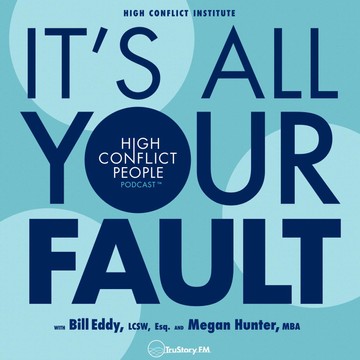
Mar 6, 2025 • 31min
Calm Before Think: Mastering Emotional Management in Professional Settings
Cherolyn Knapp, a workplace conflict expert from the High Conflict Institute and experienced lawyer and mediator, shares her insights on emotional management in professional settings. She discusses the phenomenon of emotional contagion and how unmanaged emotions can escalate conflicts. Cherolyn introduces practical techniques like the 'calm before think' approach, grounding exercises, and positive self-talk to foster resilience. The importance of investing time in emotional management is emphasized, demonstrating how it can enhance productivity and workplace harmony.
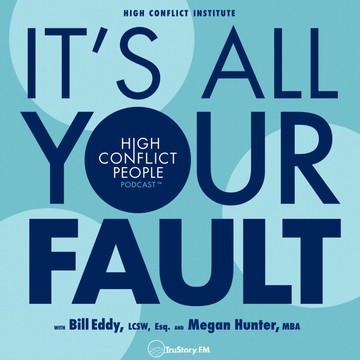
Feb 27, 2025 • 37min
When Home Hurts: Managing High Conflict's Impact on Your Career
Explore how conflicts at home can drain emotional resources and impact workplace performance. Discover the neuroscience behind stress responses and the role of self-encouragement in maintaining resilience. Gain insights into establishing effective communication with employers while managing personal issues. Learn to create a supportive workplace environment that nurtures mental well-being. Engaging stories and practical strategies make this discussion both relatable and informative, addressing the intricate balance between personal struggles and professional growth.
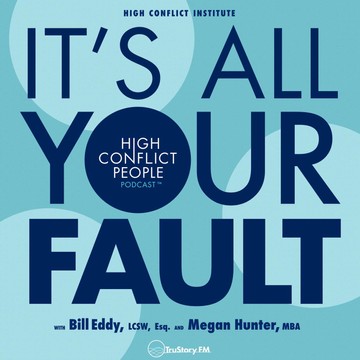
10 snips
Feb 20, 2025 • 33min
Seeds of Personality: Understanding Psychopathy's Origins and Impact (Part 2)
Dive into the fascinating world of psychopathy as experts discuss its origins and how personality traits develop by age six. Discover whether someone can suddenly become psychopathic and explore the intricate interplay of genetics, childhood experiences, and culture. You'll find insights on identifying warning signs in relationships and workplaces, alongside practical advice for navigating interactions with high conflict individuals. The conversation also highlights the historical advantages of these traits and the necessity of empathy in relationships.
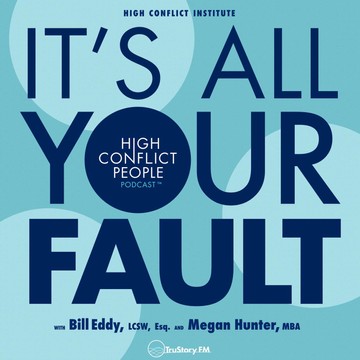
Feb 13, 2025 • 37min
Beyond the Mask: Understanding Psychopathy in Modern Society (Part 1)
Dive into the complex world of psychopathy and its staggering $460 billion annual toll on the U.S. criminal justice system. The hosts uncover early warning signs of antisocial personality disorder and emphasize the vital role of intervention. Learn about psychopathy's three key traits: disinhibition, callousness, and boldness, and how they impact relationships and the corporate world. Gain insights into modern diagnostic approaches that treat traits as a spectrum, opening doors for better understanding and management of these challenging behaviors.
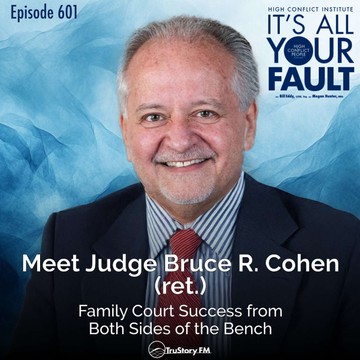
Feb 6, 2025 • 45min
Meet Judge Bruce R. Cohen (ret.): Family Court Success from Both Sides of the Bench
Join retired Judge Bruce R. Cohen, who spent nearly two decades on the bench in Arizona, as he shares his wealth of experience in family law. He discusses the evolution of the 'best interests of the child' standard, moving beyond gender bias to focus on individual needs. Bruce shares personal stories that highlight the importance of recognizing humanity in each case. He offers practical insights for parents on how to effectively present their cases in court, emphasizing the child's well-being over past conflicts.


